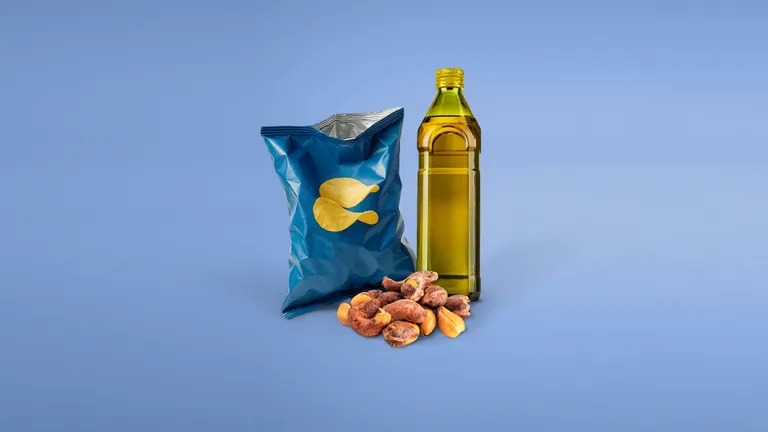This is not waste.

It’s the start of something new. We’re rethinking waste and turning it into value. At OMV, we see value where others see waste. By transforming discarded waste streams into essential raw materials, we’re reinventing the fundamentals for sustainable living.
A future built on circular thinking
Urgent environmental and climate challenges demands more than intention – it requires reinvention. Waste streams are no longer an inconvenient by-product to be discarded, buried or incinerated – they are valuable resources. At OMV, we believe it’s time to change the narrative; we’re leading the transition from linear consumption to circular innovation, creating value.
Through industrial expertise and advanced technologies, we transform diverse waste streams into high-value feedstocks that drive a regenerative economy – for people and planet.
Reinventing what matters most
Across all our business segments, we are reimagining the building blocks of modern living – reducing environmental impact while powering progress. We’re transforming diverse waste streams into valuable resources and are looking into ways to create value across our entire ecosystem.
We call it re-inventing essentials for sustainable living – turning climate challenges into industrial solutions and unlocking new growth through circularity.
Our vision is anchored in measurable progress – here is how we are turning commitment into impact:
From emission to resource
Carbon dioxide is a natural part of life. It’s present in the air and is used for industrial and consumer products. But it is a proven fact that it accelerates climate change. We need to focus on how to manage it – by avoiding emissions wherever possible, safely storing it (CCS: Carbon Capture and Storage) and finding new ways to put it to use – as a feedstock for useful products, from synthetic fuels to plastics. In sectors where emissions are technically avoidable but structurally challenging to reduce, accelerating the adoption of available low-carbon technologies is essential.
This helps to:
- Contribute to net reductions in atmospheric CO2 emissions and improving lifecycle performance across the value chain
- Create low-carbon raw materials
- Enable circular manufacturing processes
A chance to decarbonize mobility
Even kitchen waste has potential. We convert organic waste, such as used cooking oil, into Sustainable Aviation Fuel (SAF) – an alternative to conventional jet fuel with an 80% lower greenhouse gas footprint over its lifecycle. It’s compatible with today’s aircraft engines and airport infrastructure.
This helps to:
- Lower lifecycle CO2 emissions
- Enable efficient use of resources and infrastructure sustainably
- Support growing demand for SAF, driven by EU policy (e.g., ReFuelEU) and cooperations
From fields to feedstock
Nature leaves nothing behind – and neither do we.
At OMV, we recognize that agriculture generates vast quantities of by-products – many of which are overlooked or discarded. We harness this untapped potential by converting materials like straw, corn stover, sugar beet residues, algae, and cashew nutshell liquid into bio-based feedstocks for fuels and petrochemicals. Biotechnology plays a central role in this transformation. By utilizing renewable raw materials and biological processes, we are pioneering innovative pathways that replace fossil-based inputs with sustainable alternatives. This approach not only reduces reliance on fossil resources but also promotes responsible land use – without competing with food production systems.
This helps to:
- Convert agricultural residues into high-value resources that would otherwise be wasted
- Support advanced biofuel production
- Reduce dependency on fossil resources
We’re building on modest volumes today to scale the impact for tomorrow.
Reusing what we already have
Our operations at the Schwechat Refinery generate large amounts of heat – much of which would simply be discarded into the atmosphere. We see it as a resource.
We deploy waste heat recovery systems to capture this thermal energy and repurpose it for our own operations or in nearby infrastructure. In some cases, it’s even used to deliver heat to district heating systems for homes and businesses.
This helps to:
- Save energy by reusing heat
- Reduce operational emissions
- Strenghten local energy systems with renewable heat
OMV is turning overlooked energy into opportunity – proof that reinventing essentials for starts with smarter use of what we already have.
Closing the loop with circular polymers
Plastic waste is among the most pressing environmental challenges of our time – and we’re helping tackle it. At OMV, we’re driving a new resource paradigm: one that valorizes plastic waste as a feedstock without elimination but by closing the loop
Through our proprietary chemical recycling ReOil® technology, we convert mixed, post-consumer plastic waste into pyrolysis oil. This serves as a feedstock for producing new, virgin-quality plastics. Developed, tested, scaled in-house and now fully operational.
This helps to:
- Keep plastic out of landfills and incinerators
- Recover high-value material from low-quality plastic waste
- Reduce reliance on fossil-based feedstock
OMV isn’t just responding to a problem – we’re shaping the solution. By industrializing circularity, we’re showing that the future of plastics isn’t disposable – it’s regenerative.
Waste is just the beginning
The linear economy – take, make, dispose – is no longer applicable. Resources are finite, emissions must fall and waste is too valuable to ignore.
Circularity means maximizing material value, minimizing environmental impact, and designing systems that regenerate rather than deplete.
We are:
- Reducing environmental impact through innovative technologies
- Developing circular feedstocks to replace fossil-based inputs
- Capturing and valorizing emissions and industrial waste streams
- Closing loops across our value chain to drive systemic change for the regeneration of nature